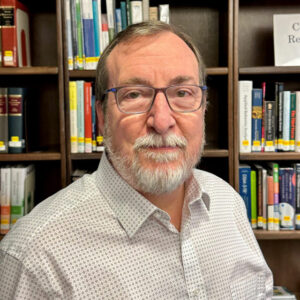Dr. Mike Tyler joined MSP’s leadership as the Dean of Academic Programs in December. Dr. Tyler has 20+ years of experience in higher education, most recently serving as the Associate Provost of Graduate and Online Education at Valparaiso University. Outside of academia, Dr. Tyler has clinical experience in residential treatment and private practice. Dr. Tyler’s faculty profile can be found here.

What’s your favorite non-academic book and why?
Identifying a single book that is a favorite is really tough. Books hit me in many different ways and what resonated a decade ago may no longer seem as powerful. There are a few books though that I continue to refer to after many years. That suggests to me that they had a real impact. One of those is Nickel and Dimed: On (Not) Getting by in America by Barbara Ehrenreich. I love this book because it challenges so many myths and reminds me that I can’t take my privileged view and understanding and impose it on another. My world really is different than the world that others live in and I think this book captures that reality as well as any phenomenological research that I’ve ever read.
What or who influenced you to study psychology?
My childhood was not particularly remarkable for the time and place I grew up. My family perpetuated its own unique dysfunctions and I internalized that dysfunction in ways that were largely expected, in ways that mimicked my peers, and in ways that maintained homeostasis in the family. Ultimately, that stopped working and I found that drugs and alcohol were a really powerful way to respond. It’s all a little cliché for a child of the 1960s and 1970s.
The piece that makes the story a little different is that I found my way out of the delinquent behavior and substance abuse, as well as the depression and anxiety through a 12-step based program. It was there that I found a family, friends, acceptance, and hope for the future. As a young adult, I decided that my life could be of importance to others if I could help others change and grow in the ways that others had helped me. The path wasn’t straight and I took detours along the way to experiment with other ways to help my community or those in need. Ultimately, I came to see that meaning in one’s life is created by what we do and how we live, and I determined the meaning of my life was inextricably bound to helping others live their lives in a more healthy and productive manner.
What attracted you to working at MSP?
I have been working primarily outside the discipline of psychology for a number of years. This has required my focus to be broadly spread across disciplines as I worked to address the needs of larger institutions. MSP allows me to narrow my focus to the discipline that captured my imagination years ago and continues to intrigue and excite me today.
What are you looking forward to most in this position?
I’m really excited to have an opportunity to work with a great faculty to find ways to strengthen the programs at MSP. Before considering work for MSP, I took time to get a feeling for the quality of the programs and the trajectory of the institution. I know this is a good program that provides excellent educational experiences. I also know that institutions, like people, can never stop changing. Change is a part of life and the institution can either strive to improve and remain relevant, or it can seek stasis and risk decline. I think there are strong clinicians at MSP that have great ideas to continue the growth of the school. I want to be a contributor to that process.
What advice would you like to share with incoming or current students?
Graduate school is tough, and it should be. When you are done with graduate school you will be among an elite group of individuals that possess a graduate degree. By choosing to go to graduate school, you are choosing to set yourself apart, to declare to the world that you are something special and that you have something unique to contribute. You are making a commitment to the professional community that you are entering. More importantly, you are asking every client you will interact with in the future to allow you the privilege of being a partner in their life at what may be their most difficult moments. By choosing this profession, you are making a promise. That is an important and consequential step.
In many jobs, if we “phone it in” some days, the consequences are not great. Productivity may decline and the company may not make quite the same profit. Maybe a customer has a bad experience and leaves grouchy. In our profession, a bad day has real-world consequences that can last a lifetime. Who we are, what we know, and how we engage matters every single time.
My advice to anyone entering graduate school in psychology is to recognize the importance of the agreement you are making with your future clients, and then commit to making your time in graduate school the most productive educational experience of your life. Make graduate school a priority- your clients deserve that. It may mean that for a year or two while you are here at MSP something else slips. No one can do it all. NO ONE. So we prioritize. For you to be truly gifted in your work with clients, you need a foundation that is absolutely second to none. Understand that your commitment to graduate school is the commitment to caring for everyone you will work with in the future and then engage in graduate school in a manner that demonstrates the privilege clients bestow upon us by letting us into their lives.